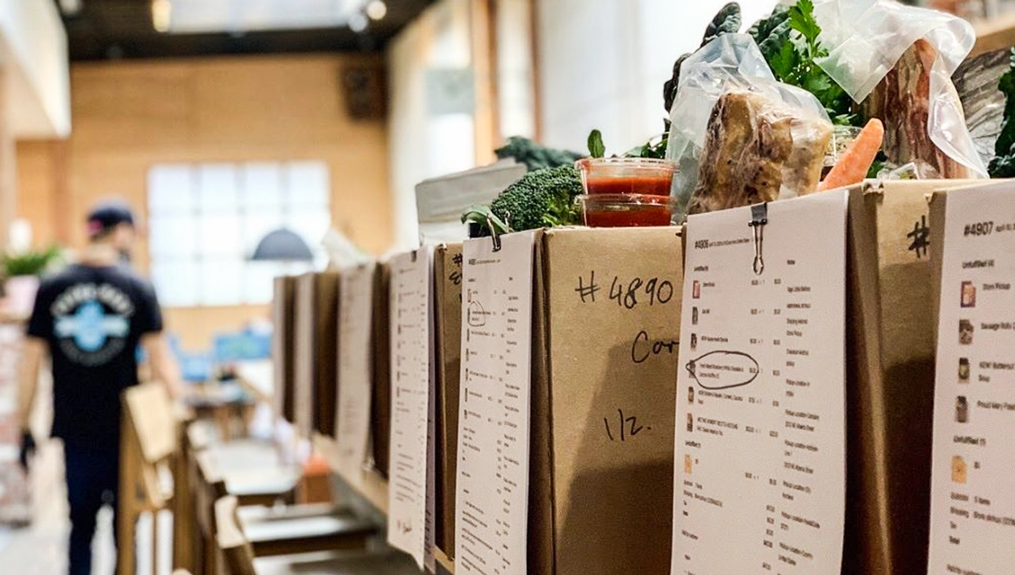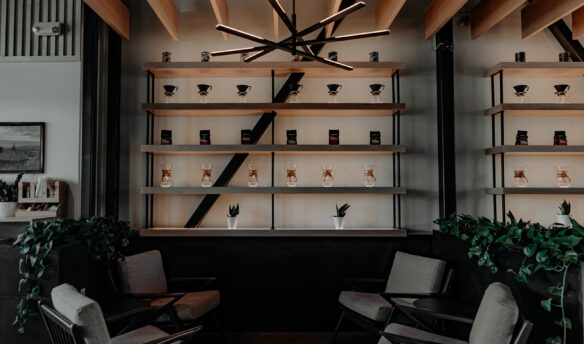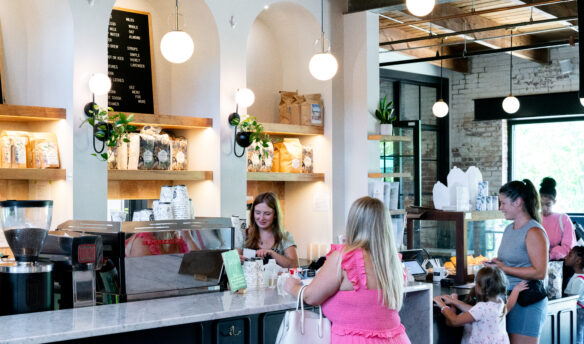Food Box prep at Proud Mary Coffee in Portland. @proudmaryusa
Specialty Coffee Roasters & Retailers Shift Through Quarantine with Food Boxes, Big-Format Beverages
As winter this year faded into warmer spring days, COVID-19 shutdowns gripped communities and temporary local lockdowns faded into long-haul quarantines for many.
So by late March and throughout April, while essential workers remained steadfastly in place, countless consumers adjusted to “virtual” work-from-home spaces. For many, ritualized stops at coffee shops, morning commutes, and even regular grocery outings shifted to home coffee brewers, kitchen table conference calls, and new approaches to grocery store shopping.
As cafés and restaurants closed temporarily, and by the time communities lifted restrictions and permitted takeout with limited in-house options, savvy industry professionals had already waded into the new world of to-go orders and window pickups.
Making Things Mobile
Ohio-based Crimson Cup Coffee & Tea launched a new iPhone app to make mobile ordering and pickups simpler for beverages and foods to-go at its Columbus and Akron-area cafés. The roaster even parked its mobile coffee truck outside one of its cafés to serve drinks, retail bags, and other supplies.
The bulk-packaging trend for cold beverages also expanded for many coffee roasters and retail cafés. And it’s more than cold brew in glass growlers and other large-format vessels: ready-to-drink lattes, chai, and other libations offered consumers new options for online ordering and delivery.
Curated Pantries
Other specialty coffee leaders took it further with food. G&B Coffee’s Go Get Em Tiger cafés throughout the Los Angeles area now feeds locals with curated pantry favorites reflecting the wealth of southern California food culture.
For customers enduring quarantines and devastating fires, GGET pantry selections have showcased staples ranging from kosher salt, flours, and olive oils to small-batch pickles, artisan breads, fresh produce, ready-to-eat soups, and, of course, retail bags of its own whole bean coffees.
The rotating pantry menus complement the ambitious food offerings already showcased at each GGET café throughout greater L.A.
Regional & Seasonal
At its three Cocoa Cinnamon retail cafés in Durham, North Carolina, Little Waves Coffee Roasters quickly adapted this spring with its drink menu, offering large-format cold brew and iced lattes, for example.
“We have definitely had to pivot our business to meet the needs of people working from home, who are avoiding unnecessary trips to big-box grocery stores, and drinking coffee at home instead of in coffee shops,” says Ariel Studenmund, who serves as the roaster’s wholesale account manager when she isn’t roasting in the company’s production space.
Little Waves extended the mindset into a regional alliance with The Produce Box, a fresh food box service based in Raleigh. The roaster began supplying the service this summer with fresh coffees alongside regional seasonal produce like peaches, sweet corn, tomatoes, and zucchini.
Studenmund says Little Waves also added retail coffee selections to small local markets and food co-ops, along with new COVID-era mercantile pop-ups in restaurants.
The reaction has elicited positive feedback for the convenience factor—especially for people new to working at home and new to home brewing, and for those who have a desire to get groceries delivered instead of heading into the stores themselves.
That effort helps Little Waves support “the movement to partner with other independent local producers and also help people shop safely for food in the time of COVID,” adds Studenmund. “Our local community has been so supportive in and around Durham. We’ve been really grateful to have that.”
Produce & More
The Portland outpost of Australia’s Proud Mary Coffee this spring began offering produce boxes for home delivery. The service complemented its café food offerings including muffins, pies, and rolls.
Back in the Midwest, Ruby Coffee Roasters in Wisconsin also began offering organic food boxes this spring when increasing numbers of consumers began staying home in the earliest days of the pandemic. A $55 purchase landed buyers everything from carrots, strawberries, and cauliflower to citrus and foraged ramps.
















